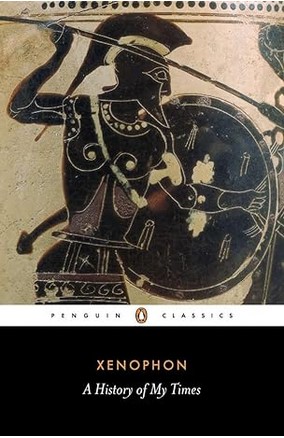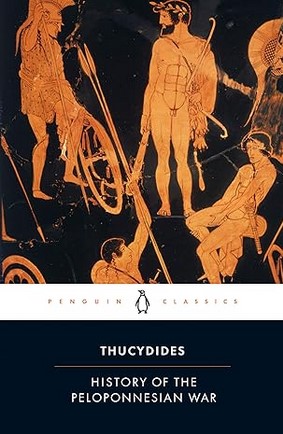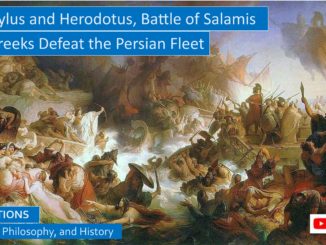
In our prior video we ended with the Peace of Nicias, pausing the Archidamian War, which was the first phase of the Peloponnesian Wars. This period of history includes many of the most memorable stories told by Thucydides and Plutarch’s Life of Nicias. This history includes the inevitable failure of the Peace of Nicias, and some of the many conflicts between Athens, Sparta, Argos, Corinth, and Thebes kept the Peace of Nicias from being a truly peaceful time. We will reflect on how the large Athenian fleet of several hundred triremes were destroyed and nearly all the Athenian rowers and hoplites were either slain or enslaved in the failed Sicilian Expedition.
YouTube video for this blog: https://youtu.be/SaIqQ35ysl4
YouTube script with more book links: https://www.slideshare.net/BruceStrom1/athens-disastrous-defeat-at-syracuse-in-the-sicilian-expedition-the-peloponnesian-wars
Link to view complete series of blogs on the Peloponnesian Wars:
https://seekingvirtueandwisdom.com/category/peloponnesian-wars/
Link to view complete series of videos on the Peloponnesian Wars:
https://www.youtube.com/watch?v=szi7-9QQWI0&list=PLJVlY2bjK8lg2pivnGN3m13VI8YstKs0T
The Peace of Nicias would somewhat hold for seven years, and was negotiated between Nicias, an Athenian aristocrat who, like Cimon before him, sought to reconcile with the Spartans. Nicias negotiated the peace with King Pleistoanax, who had been exiled from Sparta for twenty years for negotiating the previous Thirty-Year Peace with Athens before the outbreak of the wars. Professor Kenneth Harl of the Teaching Company posits that this peace had limited support in both city-states, and that it was more a treaty between two leaders and their supporters, accepted by a populace that was weary of war.
The major terms of the Peace of Nicias were:
- Exchange of prisoners of war, crucial to the Spartans since the three hundred hoplites captured on the island of Sphacteria near the Peloponnese Athenian base Pylos.
- Recognition of the Athenian Empire, with Sparta abandoning the quest to free the Greeks, now both city-states were free to deal with their allies as they wished.
- Most of the territories captured by Athens or Sparta would be restored.[1]
The war between Athens and Sparta was only the main conflict, wrapped up in the Peloponnesian Wars was a host of other localized alliances and conflicts, and the Peace of Nicias was doomed in part because it ignored the issues important to Sparta’s allies. But the negotiations ignored the allies of both powers. Although the members of the Athenian Empire were subservient to Athens, the allies of Sparta were independent and sometimes troublesome. In particular, the Thirty Years Peace Sparta had signed with its western neighbor, Argos, was about to expire, and Argos was making territorial demands, threatening to ally with Athens.
The Main Alliances and Conflicts During Peloponnesian Wars include:
- Sparta and Athens: Conflicts occurred when Athens sought to extend the Athenian Empire past the Aegean Sea, where it struggled to wrest the Greek colonies of Ionia from Persian control.
- Corinth and Athens: Corinth was also a naval power, she lost control over several of her colonies in conflicts with Athens.
- Argos and Sparta: Argos was a radical democracy. Argos long sought to usurp the leadership of the Peloponnese from Sparta, unsuccessfully.
- Thebes and Boeotia: Thebes and Corinth were the leading city-states after Athens and Sparta, Thebes formed a coalition of states in central Greece, and defeated Sparta in the wars succeeding the Peloponnesian War.
- Mytilene and the lesser city-states on the island of Lesbos: Other islands had similar conflicts between cities.
- Syracuse and the lesser Greek city-states of Sicily: This was in the Spartan sphere of influence, these city-states also had to contend with the Carthaginians and native city-states, there was successful Athenian action in Sicily prior to the disastrous Sicilian Expedition.
Thucydides tells us, “Argos had refused to renew her treaty with Sparta, and now the Spartan view was if an alliance between Sparta and Athens could be negotiated, Argos,” without Athenian aid, would likely “remain quiet. Discussions took place with the Athenian representatives on the spot, agreement was reached, and oaths were exchanged ratifying an alliance” lasting fifty years between Athens and Sparta, signaling to the members of the Peloponnesian League that they should not oppose the peace. This alliance bound both states to assist if the other was invaded, and Athens promised to help put down any helot slave rebellion against Sparta.
So rather than reassuring her allies who were reluctant to accept the Peace of Nicias, Sparta instead sought to bully them into submission by becoming an ally of Athens! Did Sparta really expect her allied Greek city-states to humbly submit to her great power?
THE PEACE OF NICIAS IS NOT THAT PEACEFUL
Did the Peace of Nicias have a chance? This editorializing by Thucydides gives us a glimpse on how he viewed the political situation: “As time went on the Spartans lost the confidence of the Athenians because they failed to carry out some of the terms of the treaty,” though Sparta did attempt to browbeat her allies into acknowledging the treaty provisions. “True, for six years and ten months Athens and Sparta refrained from invading each other’s territory; abroad, however, the truce was never properly in force, and each side did the other a great deal of harm, until finally they were forced to break the treaty made after the ten years, and once more declare war openly upon each other.”
Thucydides continues, “One only has to look at the facts to see that it is hardly possible to use the word ‘peace’ when neither side returned nor received what was promised. In addition, both parties breached the treaty in connection with the Mantinean and Epidaurian wars. Also, their Thracian allies were as hostile as before, and the truce with the Boeotians,” led by Thebes, “had to be renewed every ten days.”
Thebes was reluctant to free its Athenian prisoners of war, and other allies were unhappy, and most of the Spartan allies refused to swear to the oaths accepting the Peace of Nicias. But Corinth was the troublemaker who provided some sparks to start the Peloponnesian Wars, and they were now making sparks to resume the war.
Corinth engaged in constant diplomacy to obstruct the Peace of Nicias out of sheer spite. According to Professor Kenneth Harl, recent scholarship suggests that Corinth was the Greek city-state that suffered the most by the economic deprivations of the war, so her hatred of Athens rather than economic considerations drove her scheming. Now that Athens and Sparta were allies, Corinth sought at first an alliance among the other Greek city-states, but then decided to join an alliance against Sparta with Argos, along with Mantinea and the Chalcidians of Thrace. Corinth had the nerve to send ambassadors to Athens arguing that since Thrace had a renewable ten-day armistice with Athens, so should Corinth, but the Athenian Assembly denied this request, pointing out that she already included in the terms of the Peace of Nicias.
Sparta was unable to persuade her allies to return Amphipolis with her silver mines to Athens, so Athens refused to return Pylon and her other naval bases in the Peloponnese to Sparta. Thucydides describes complicated diplomacy and posturing among the Spartan allies, chief among them was Corinth, that aggravated the politics.
In the year after the Peace of Nicias there would be new leaders in both Sparta and Athens that thought the peace was a mistake. In Athens, this leader was Alcibiades, an aristocrat who was raised in the household of Pericles after he was orphaned by his parents’ untimely deaths. The behavior of Alcibiades was as outrageous as was his ambition, he was an outstanding general who could have been the conquering Julius Caesar of Athens had he not attracted so many political enemies who sought to discredit him at any cost to the state.
Will Durant tells us, “When Alcibiades entered politics after the death of Pericles, he found only one rival, the rich and pious Nicias. But Nicias favored the aristocracy, and peace; therefore, Alcibiades set himself to favor the commercial classes, and preached an imperialism that touched Athenian pride; the Peace of Nicias was sufficiently discredited in his eyes by bearing his rival’s name. In 420 BC Alcibiades was elected one of the ten generals and began weaving those ambitious schemes that led Athens back into the war.” Alcibiades is the most fascinating personality of both the Peloponnesian Wars and the Platonic dialogues, a succeeding video will reflect on his part in the history of the war and on Plutarch’s biography.
The devious character of Alcibiades is seen in this passage of Thucydides. Argos was seeking an alliance with Athens, and when they heard this, the Spartans sent ambassadors. Thucydides says this about the spitefulness of Alcibiades, “He did not like the fact that the Spartans had negotiated the treaty through Nicias and Laches, paying no attention to him because of his youth,” so Alcibiades sent a message to the Argives to send ambassadors as soon as possible.
The Spartans contacted Alcibiades, seeking to win him over to their cause. Alcibiades “pledged to the Spartans that if they made no mention of their full powers” to negotiate a settlement, that he would bring the Assembly over to the Spartan side. “Alcibiades’ plan was to drive a wedge between the Spartans and Nicias.” As Alcibiades instructed them, when “the Spartans came in front of the Assembly, in response to a question, said the opposite of what they said in the Athenian Council, that they had not come with full powers to negotiate, the Athenians lost all patience with them, and listened instead to Alcibiades, who now attacked the Spartans even more bitterly than before.”
Plutarch, in his account of this exchange, written many centuries later, stressed more strongly how Alcibiades double-crossed the Spartans. The proceedings were interrupted by a minor earthquake, and the next day Nicias convinced them to send him to Sparta to negotiate the return of Amphipolis with her silver mines and other issues, but the Spartans were not willing, nor were they able, to compel the Boeotians to comply with the treaty provisions.
So, Athens allied with Argos, which created the odd diplomatic stance that she would support both Sparta and Argos if one attacked the other. Corinth, since she was the enemy of Athens, did not join in this alliance, but stayed in the prior alliance with Argos, saying she would come to their aid if Argos were attacked, but not if Argos was the attacker.[2] Indeed, Athens was involved in hoplite battles in the Peloponnese, you can read the many chapters in Thucydides on this back-and-forth campaign.
THE DISASTROUS SICILIAN EXPEDITION
A delegation from the small Sicilian Greek colonies traveled to Athens, seeking assistance in their struggles with Syracuse, the dominant city in Sicily. This was not the first time Athens was involved in Sicily, she had won some minor victories a few years back. This adventure appealed to Alcibiades, who dreamed of glory and booty possible once he wrecked the peace. But, as Plutarch notes, “it was Nicias who objected to the idea of sending an army to Sicily,” “but was defeated by Alcibiades’ ambitious designs. Even before the Assembly met, Alcibiades corrupted most of the people,” “winning them over so thoroughly that all men, young and old, sketched maps of Sicily.” “They did not regard Sicily as the ultimate prize of war as much as a base of operations, from where, they imagined, they could set out to take on the Carthaginians and gain control of Libya and the whole of the sea east of the Pillars of Hercules,” or Gibraltar today.
Plutarch continues, “Nicias persevered, and refused to give up.” “He tried to change the minds of the men in the Assembly, accusing Alcibiades of trying to satisfy his own personal greed and ambition by forcing the city to undertake a difficult, dangerous war overseas. Thucydides records the speech of Alcibiades, who proclaims to the Assembly, “It is not possible for us to calculate, like housekeepers, exactly how much empire we want to have. We must plan new conquests to hold on to what we have, there is a danger that we will fall under the power of others unless others are in our power.”
Nicias then objects and state that an invasion of Sicily is such a daunting task that Athens needs more ships and also a hoplite army, and archers, and slingers, and vast supplies, and the Athenians agreed, approving a grand expedition of 134 triremes with all the supplies and five thousand hoplites that Nicias suggested! As Plutarch wryly notes, “Once Nicias failed in his attempts to convince the Athenians to abandon the war or to be relieved of command,” “the Athenians deposited him at the head of the expedition, where his excessive caution and hesitation were out of place,” and Alcibiades and Lamachus were the junior generals.[3]
One night, shortly before the expedition departed, vandals knocked off the faces and phalluses of the stone Hermae in Athens. These Hermae were thought to guard both houses and temples from bad spirits, but as Thucydides remembers, “this was taken very seriously, as it was regarded as an omen for the expedition, and at the same time as evidence of a revolutionary conspiracy to overthrow the democracy.”
The identity of these vandals was never discovered, some scholars speculate they were aristocrats angry with Alcibiades. Alcibiades was the main suspect, but nobody would prosecute him while he was in Athens. But a few months after the expedition set sail, his enemies did prosecute him. Since many of his supporters served on the expedition, Alcibiades would lose in court, so charges were brought, and a trireme was dispatched to fetch him. Alcibiades slipped away when they were in port, making his way to Sparta, who welcomed him as a refugee, a story we will tell in our video on Alcibiades.[4]
Although they had been warned of the large Athenian expedition launched against them, the Syracusans were not prepared when the Athenian fleet appeared in their waters. Syracuse was as large a city as was Athens, but if Nicias had not been so cautious, wasting so much time sailing around Sicily to intimidate the Sicilians, but had rather landed and attacked vigorously, they likely would have been triumphant. But instead, after a hoplite battle on the beaches of Syracuse, the Athenians wintered in the Sicilian city of Catana.
In contrast, the Sicilians were not idle, they sent ambassadors to Sparta, who promised to aid the Sicilians and declared war on Athens for violating the peace. A small force of hoplites were sent to Syracuse under the command of Gylippus, who started training the Syracusans how to face the Athenians in battle.
The next spring, the Athenians sailed back to Syracuse and began building siege walls to take Syracuse. Then Lamachus was killed in battle, Nicias was the only general in charge, and all momentum was lost, the Syracusans started building a counter-wall to prevent the siege, took control of the heights, threatening to trap the Athenian fleet. Instead of pulling out, fearful of the damage to his reputation, Nicias wrote a letter to Athens pleading illness, and requesting that he be relieved, and the Athenians sent reinforcements the next spring.[5]
The Syracusans won a number of battles, but were surprised when, as Plutarch tells us, “Demosthenes appeared off the harbors in a magnificent show of strength which dismayed the enemy. He had brought seventy-three ships, with five thousand hoplites on board, and at least three thousand others armed with javelins, bows, and slings,” “designed to strike fear into the enemy.”
However, these reinforcements did not cheer Nicias up for long: at their first meeting, Demosthenes argued for engaging the enemy immediately, for them to risk all in battle as soon as possible, and either take Syracuse or sail back to Athens. Nicias, being Nicias, preferred delay, but Demosthenes risked a night attack on the heights. In the past, Demosthenes had led several successful night attacks. Perhaps had the Athenian forces had not lost the initiative over these years of inaction they would have succeeded, but the momentum had long been lost, there was heavy fighting and much confusion, and many Athenians fell off the cliffs to their deaths.
Plutarch tells us, “Nicias was disheartened by this disaster, which he blamed on Demosthenes’ rashness. Demosthenes said this had nothing to do with it and suggested they leave the island as soon as possible, arguing that no more reinforcements would come, and that they could not defeat the enemy with their current resources.” “But Nicias was unhappy with talk of retreating and leaving the island” for fear “of the Athenians with their lawsuits and informers,” saying that “he preferred death at the hands of his enemies to death at the hands of his fellow citizens.”
But after the enemy received reinforcements, Nicias agreed to evacuate. But, as Plutarch tells us, “when everything was ready for this evacuation, and the enemy was completely off guard, there was a lunar eclipse. Nicias and those of his men who were ignorant or superstitious were terrified.” Nicias insisted they could not set sail for twenty-seven days, a full lunar cycle, not the mere three days that the omen dictated. “Nicias ignored almost everything else and spent his time on sacrifices and divination, without moving, until in a combined assault the enemy invested the Athenian fortifications and camp by land, while surrounding and blockading the harbor with their fleet.”[6]
The Athenians were now doomed. They tried several more times to board their ships and fight their way out of the harbor, they were forced back onto the beaches. With few provisions and low morale, shamed and anguished over having to leave their dead and sick behind, they burned their ships and started a desperate march south, but the Syracusans dogged their every step, attacking them along the way. After several days of desperate battles and struggles, they sought to cross a river.
As Thucydides tells us, “Once they reached the river, the Athenians rushed into it, and now all discipline was at an end. Every man wanted to be the first to get across, and as the enemy persisted in its attacks, the crossing now became difficult. Forced to crowd in close together, they fell upon each other and trampled each other underfoot; some were killed immediately by their own spears, others got entangled and with the baggage were swept away by the river. Syracusan troops were stationed on the opposite bank, hurling down their weapons from above on the Athenians, most of whom, in a disordered mass, were greedily drinking in the deep riverbed. And the Peloponnesians came down and slaughtered them, the water immediately became foul, the nevertheless they kept on drinking it, all muddy as it was and stained with blood; indeed, most were fighting among themselves to have it.”
Finally, Nicias surrendered his forces, who were doomed to die in the quarries of Sicily, a few found refuge in Catana. Gylippus wanted to bring the two Athenian generals with him to Sparta as war prizes, but the Syracusans quickly slaughtered them both. And Thucydides dryly ends this chapter, “So ended the events in Sicily.”[7]
There was no mass media in Ancient Greece, this is how the Athenians first learned of their defeat, according to Plutarch: “A stranger landed in the Piraeus,” the port of Athens, “sat down in a barber’s shop, and proceed to talk about what happened at Syracuse as if the Athenians already knew about it. The barber listened to what the stranger had to say, and then, before he could tell anyone else, ran at top speed to the city, rushed up to the archons, and immediately made the news public knowledge. It was, of course, greeted with amazement and consternation. The archons convened an assembly and brought the man in.” They suspected that “he made the story up to cause a commotion. He was strapped to the wheel and tortured for a long time, until messengers arrived with accurate information about the whole catastrophe. This how difficult it was for them to believe that Nicias had suffered the fate which he had often warned them about.”[8]
We cannot improve on Will Durant’s summary of this ignoble defeat:
“The disaster broke the spirit of Athens. Nearly half the citizen body was enslaved or dead; half the women of the citizen class were widows, and their children were orphans.”
With modern scholarship, Professor Kenneth Harl estimates that only a quarter to a third of the male citizens of Athens were lost at Syracuse, which makes more sense, but is still a devastating blow.
Will Durant continues, “The funds that Pericles had accumulated in the treasury were almost exhausted; in another year the last penny would be gone. Thinking the fall of Athens imminent, their subject cities refused further tribute; most of her allies abandoned her, and many flocked to the side of Sparta. In 413 BC Sparta, claiming that the Fifty Years Peace had been repeatedly violated by Athens, renewed the war.” “Their supply of food from Euboea and of silver from Laurium stopped; the slaves in the mines at Laurium revolted and went over to the Spartans in a body of twenty thousand men. Syracuse sent an army to join in the attack; and the Persian King, seeing an opportunity to avenge Marathon and Salamis, provided funds for the growing Spartan fleet, on the shameful understanding that Sparta would assist Persia in regaining mastery over the Greek cities of Ionia.”
“It was a proof of Athenian courage, and of the vitality of Athenian democracy, that Athens stood off her enemies for ten years more.”[9]
[1] Kenneth Harl, History of the Peloponnesian Wars, Teaching Company.
[2] Thucydides, History of the Peloponnesian War, Book 5.22-48, pp. 361-380, and Kenneth Harl, History of the Peloponnesian Wars, and Will Durant, Life of Greece, p, 445.
[3] Plutarch, Greek Lives, Nicias, translated by Robin Waterfield ((New York: Oxford University Press, 2008, 1998, originally 100+ AD), Chapters 12-14, pp. 197-199 and Thucydides, History of the Peloponnesian War, translated by Rex Warner (London, Penguin Classics, 1972, 1954, originally after 410 BC), Book 6.18, pp. 421-422.
[4] Thucydides, History of the Peloponnesian War, Book 6.27-28, pp. 426-427, Book 6.60-61, pp. 447-448.
[5] Kenneth Harl, History of the Peloponnesian Wars, Teaching Company, 2007.
[6] Plutarch, Greek Lives, Nicias, Chapters 21-24, pp. 207-211.
[7] Thucydides, History of the Peloponnesian War, Book 6.84-87, pp. 534-537.
[8] Plutarch, Greek Lives, Nicias, Chapter 29, pp. 216-217.
[9] Will Durant, The Story of Civilization, Volume 2, Life of Greece (New York: Simon and Schuster, 1966, 1939), p. 448 and Kenneth Harl, History of the Peloponnesian Wars.









3 Trackbacks / Pingbacks